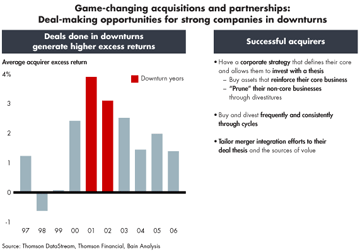Harvard Business Review
For many executives, doing a deal in a downturn seems risky and impractical. Credit markets aren't functioning normally, so financing is expensive and hard to come by. Cash reserves need to be guarded as a safety net in case the economy stays bad. Equity markets are depressed, so acquirers and targets alike are wary of stock-based transactions. A major deal could distract management from strengthening the core business and bring unforeseen hazards.
But for companies that are relatively strong strategically and financially, recessions present rare opportunities to improve their competitive position through acquisitions and partnerships.
According to Bain & Company analysis of more than 24,000 transactions between 1996 and 2006, acquisitions completed during and right after the recession from 2001 to 2002 generated almost triple the excess returns of acquisitions made during the preceding boom. ("Excess returns" is defined as shareholder returns from four weeks before to four weeks after the deal, compared with peers.) This finding held true regardless of industry or the size of the deal. Moreover, companies that acquire in bad times as well as in good outperform boom-time buyers over the long run.
View the larger version of this chart
The most important objective of mergers and acquisitions in any economic environment is to help execute a company's strategy. In a downturn, that strategy will almost certainly focus on strengthening the core business. No company can hope to weather the downturn without a strong core, and M&A can be a valuable tool for reinforcing it.
In a recession, M&A can also create strategic options. Pfizer's agreement to acquire Wyeth, for example, buys some time for Pfizer as the patents expire on several of its leading medicines. Other industries are likely to consolidate as market leaders attempt to increase their options by expanding in scale or scope—for example, wireless phone companies are adding content and software capabilities. The equity market isn't necessarily an obstacle to stock-based deals, since both the acquirer's and the target's shares are likely to be equally depressed.
M&A's most critical discipline is the investment thesis, a statement articulating why buying an asset or business will make your business more valuable. When we surveyed acquirers involved in both successful and unsuccessful deals, we found that about 80 percent of successful transactions were based on a clear investment thesis. For failed deals, the proportion was only about 40 percent.
Verizon Wireless has kept a clear thesis in mind as it has spent millions to strengthen its brand. Consumers throughout the US have seen its ads touting the "power of the network." In wireless, a brand's strength depends on state-of-the-art technology and continually expanding geographic coverage.
Those imperatives don't change whether the economy is booming or slumping. That's why Verizon Wireless has maintained a steady stream of acquisitions, including 40 deals during the period from 2004 to 2007, and into the downturn. Buying Alltel for $28.1 billion in January 2009, gave it access to additional territories. Verizon Corp., majority owner of Verizon Wireless, reported a 16.4 percent increase in earnings for 2008 compared with 2007.
Focusing on three practices can help strong companies with adequate financial resources take advantage of such downturn opportunities:
First, ratchet up the level of diligence from your M&A team. Corporate buyers seeking targets in the same industry are particularly likely to fall into the trap of inadequate diligence because executives believe they know the industry. An outside-in view of the target is essential.
Second, update the target list to reflect the changing environment. The business climate in the future is likely to be less freewheeling, more tightly regulated, less leveraged, and more risk averse. That needs to be reflected in the short list of potential acquisitions.
Finally, don't assume that conventional mergers and acquisitions are your only options. Partnerships, joint ventures and strategic alliances give companies the opportunity to compete under a number of different scenarios without the inflexibility or expense of an acquisition. The 2008 deal between Morgan Stanley and Smith Barney, for example, was structured as a joint venture rather than a merger. Nokia recently established a joint venture with the Indian company HCL Infosystems to offer services such as navigation and music for mobile phones.
The key in strategic deals or alliances is the same: to strengthen the core and stay flexible.
Read the full article, which describes effective M&A strategy in a downturn.
David Harding is co-head of Bain & Company's Global M&A practice. Darrell Rigby is the head of Bain's Global Retail practice.
